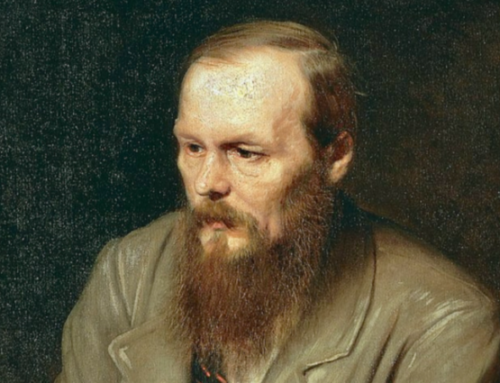Could a fifty-year-old, small book on grammar, speech, and rhetoric by a nearly-forgotten thinker have the power to revolutionize and re-awaken our decadent intellectual life?
Eugen Rosenstock-Huessy (1888-1973) might not recognize, in 2018, the America to which he came in 1933, seeking refuge from a Germany that had just elected Hitler. A Christian convert from Judaism, a professor of law and a brilliant student of languages, Rosenstock first alighted at Harvard, where he taught for a year or two. Harvard didn’t quite know what to do with him, because Rosenstock had a way of talking about God’s influence in history—and Harvard was already by then parading its secular credentials. Rosenstock was offered a professorship at Dartmouth, where he taught until his retirement in 1957. He brought forth an understanding of speech and language based upon social realities. It is a view sorely needed for a humanity whose thinking has been corrupted by abstractions of scientism.
But speech is crucial. Rosenstock often reminded us of this, and he even came up with a sociological paradigm. The word “paradigm” is actually appropriate, for it is a term from grammar, and Rosenstock’s great gift was the “grammatical method.” It doesn’t sound like much until you investigate it; but when you investigate and live with it, it becomes, like all things, simple, commonsensical, and true—indeed, indispensable.
Rosenstock believed that grammar was the key to a new sociology, and ultimately the key to a more humane society. We have for the past couple of centuries believed that truth is confined to the “Indicative,” whose model is the mathematical statement: 2 +2 = 4. Indicatives are statements of fact. They are “Objective statements.” Our new atheists are masters of pretending that only the objective statements, the indicatives, can be taken seriously, and they parade their antics of the Indicative Mode ad infinitum ad nauseam. But they might be surprised and chagrined to learn that the indicative is only the end of a grammatical process that begins with the Imperative “You,” migrates to the Subjective “I,” and finds its historical and institutional common ground in the “We.”
Indicatives have gone through the process of “happening,” and what has happened has not sprung, like Athena, from the head of Zeus. What has happened has antecedents, and these antecedents are reflected in our grammar, which in turn reflects social encounters, public events, political choices and collective decisions. And amidst these encounters, religion and rituals have played a decisive part. The mere indicative, one wants to tell those New Atheists, is a withered branch that cannot root and cannot grow.
It is for this reason that Rosenstock calls our human life, and the speech that frames it, crucial, and he illustrates this with a diagram, the Cross of Reality:
What is unique about the Cross of Reality is not that it is in the shape of a Cross—Rosenstock often said it was not intended to be a religious image. What is significant is that the vertical subject-object pole, so familiar to our philosophical heritage, is bisected by the horizontal temporal pole: future and past.
Our life, on the Cross of Reality, always demands continual adjustment and fine-tuning. It begins with the call—in older grammar, the Vocative—the Imperative. The “You” calls the “I” into life and into the process of finding our task. In reaching this state we are then in a position to seek alliances and community with others, to bond in common projects and contribute to historical narratives. We have become “We.” Only at the end of this process do we get objective facts and situations, the things that have actually happened, that can be measured and evaluated. Thus he comments, in his book Speech and Reality, “It is the pressure and seriousness of the imperative form on which depend the fruitfulness of all our indicatives.”
If this small book—originally published in 1970 by Argo Books, an imprint established by one of Rosenstock’s devoted students—could be more widely known, especially among students of language, history, literature and all forms of what used to be called “rhetoric”—it would have the power to revolutionize and re-awaken our decadent intellectual life. Containing essays on “Articulated Speech,” “In Defense of the Grammatical Method,” “Grammar as Social Science,” “How Language Establishes Relations,” “The Individual’s Right to Speak,” among others, the book goes to the root of our toxic and debased notion of “individualism”—a notion which has been so destructive of social bonds, culture, and shared history. How does he do this? By making the statement that “an individual becomes a person by being able to represent speaker and listener both within one person.” To be able to listen is to become a “You”—to wait, to become receptive, and yes, perhaps, even a bit humble. The “You,” that is, the grammatical second person, Rosenstock remarks elsewhere, is the principle of mental health—“Life in the second grammatical person is the basis for renewal of both men and peoples, and it will remain so.”
It is refreshing to hear these words. For American life is one long indoctrination into “self-esteem” and aggressive individualism. We have become sick with ourselves and of ourselves. It is toward an overcoming of this sickness that Rosenstock believed that “A higher grammar must reinstate the reality of speaking and listening people in the place of the nightmare of a speechless thinker who computes a speechless universe.” Need one add that this temptation toward speechlessness seems very prevalent today?
Modern philosophy has often slighted the factor of time—an omission which has had enormous and fatal consequences for our economic thinking. Time has been absorbed into space, and as “consumers” we give no thought for future generations nor of the time it took to form the fossil fuels we so insouciantly extract from the earth. Our technological devices have speeded up time to an unimaginable degree. It may be that the recovery or reclamation of time is has become our spiritual need of first order. By becoming aware of our speaking—of the grammatical “tenses”—we can begin to reclaim this essential part of our humanity. We cannot always afford to await the leisured overview of events, as M.E. Bradford once reminded us. Sometimes we have to act. And it is this moral duty, this leap from perception to action, which Rosenstock’s Cross of Reality highlights so clearly. As he writes in his book In the Cross of Reality: “Reality yields only to him who enters real time and real space, and makes his own participation an express presupposition of his thinking.”
Only at the end of the eras of speaking and listening, grammatical exchanges, decisions and delegations, lyrics, epics, histories, and liturgies are we finally confronted with “facts.” And the art of historical life is learning to read those “facts”—not in order to be cowed by them, not as permission to remain passive and uninvolved, but as our calling to new imperatives and battles of the soul. To become aware of our grammatical responsibility, so to speak, is a turn of the road we very much need to make in this era of looming robotics and deterministic genetics. Saving our humanity may depend upon it.
The Imaginative Conservative applies the principle of appreciation to the discussion of culture and politics—we approach dialogue with magnanimity rather than with mere civility. Will you help us remain a refreshing oasis in the increasingly contentious arena of modern discourse? Please consider donating now.
The featured image is a photo courtesy of Mariot Huessy, Eugen Rosenstock-Huessy Fund. This file is licensed under the Creative Commons Attribution-Share Alike 3.0 Unported license, courtesy of Wikimedia Commons.









Leave A Comment